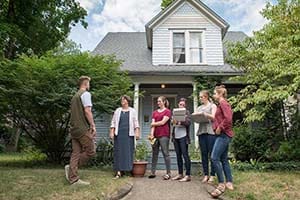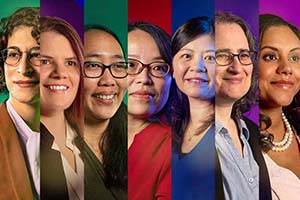
New provost Marie Lynn Miranda knows how to tell a story to drive home a point.
When her now-grown son was in Kindergarten, he saw her walking to pick him up and yelled loudly — likely to impress his friends — “Hey stinky!”
The area went quiet. Parents and students alike waited to see how one of the small school’s few mothers who worked full time would handle the situation. Her son’s eyes grew wide with anxiety. Would she discipline him? Let it pass? Ask why he said that?
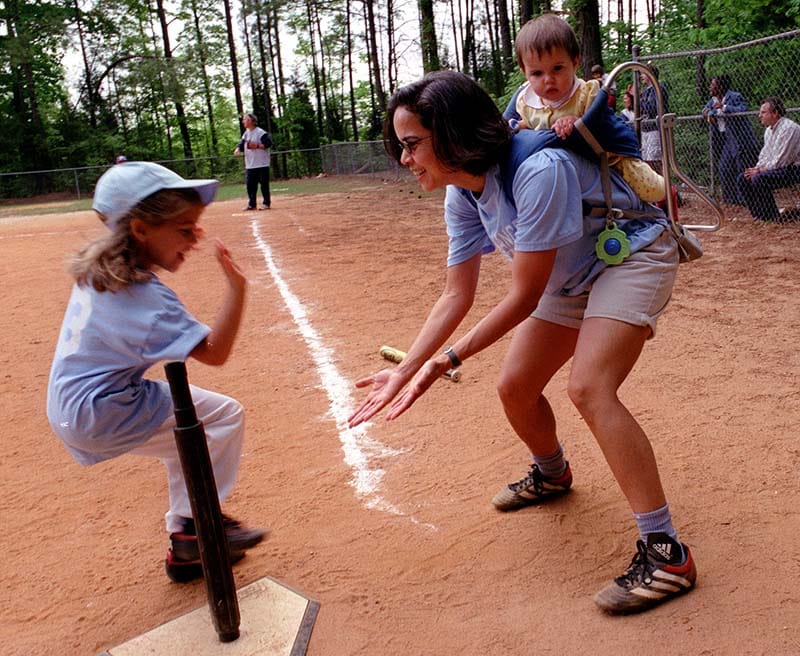
With only seconds to decide, she strode up and said, “That’s Dr. Stinky to you, son.” She smiled and put out her hand. He grasped the peace offering, smiled in relief and skipped away to the car. They laugh to this day while replaying the piece of family lore.
“Throughout our lives we are confronted with situations where we don’t quite know what to do,” said Miranda, drawing a clear line to the current problem of restarting a university during a pandemic. “We don’t know what the best thing is and we don’t necessarily have all the expertise we might ideally have. We must bring data and analysis and the best technical advice there is.”
“But when in doubt, responding with love is always a good choice.”
Miranda was announced as the successor to Thomas Burish in mid-March, just after Notre Dame and other colleges suspended in-person classes and sent students home in response to the national outbreak of coronavirus. The former provost of Rice University and a distinguished scholar in the field of children’s environmental health had been elected the Charles and Jill Fischer Provost of Notre Dame by its Board of Trustees at the recommendation of the University’s president, Rev. John I. Jenkins, C.S.C. She will take her new position on July 1.
Luckily, Miranda is no stranger to leading a university through a crisis. When Hurricane Harvey hit Houston in 2017, Rice’s president was out of the country, leaving Miranda to organize the initial campus response.
“But when in doubt, responding with love is always a good choice.”
As a professor of statistics, she used information technology to achieve her three primary goals but let love determine what the goals should be: check in with everyone immediately, determine their primary needs, and shape policies to respond. For instance, a quick online survey found that temporary housing was crucial, so the university organized a match system where those whose houses weren’t damaged would host those whose homes were.
“To our knowledge, nobody in the Rice community spent a single night in a shelter,” she said. “We used a combination of data tools and communications, wrapping a big band of compassion around it all.”
As Notre Dame faces a litany of challenges over how to safely perform all the research, teaching and other activities of a busy university community, Miranda will occupy a prominent seat at the eye of the hurricane —but she is equipped with considerable experience and a fundamentally Catholic philosophy.
“It’s been quite a wild ride since I was named provost,” she said.
Coming home
Miranda’s family is from Goa, a former Portuguese area on the southwest coast of India. Her parents and her three brothers moved to South Bend in 1961 before she was born.
“My family was able to immigrate to this country because of a fellowship that the University offered my father,” she said. “My mother, and my father if he were still alive, would tell you that we decided to stay in this country because of how Notre Dame and the South Bend community received them. Brown people didn’t always get a friendly reception, but the University wrapped them in a warm embrace.”
Her father moved on for his doctoral work to Ohio State University, where Miranda was born. He landed his “dream job” at the University of Detroit, a Jesuit institution now called Detroit Mercy. Her mother provided a clear example by pursuing bachelor’s and master’s degrees with his tuition benefit. Miranda said she observed academic life as a child, and especially her father’s deep bond with his students, but never planned to follow his footsteps.
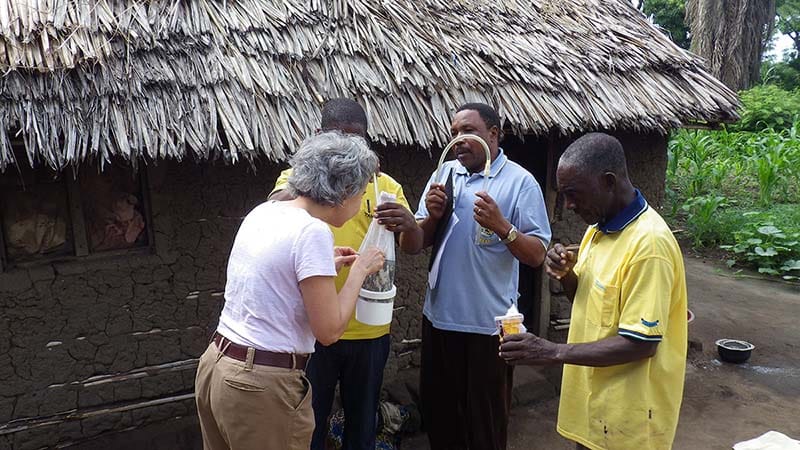
“When I was little and people asked what I wanted to be, I would tell them a fireman because it got them to stop asking me questions,” she said. “Instead of asking young people what they want to be, I always ask, ‘What’s interesting to you?’”
She said she wanted to do environmental work in the field but “adamantly did not want to become a professor.” After attending Catholic schools in Detroit, she went to Duke University in North Carolina on a full-ride scholarship. A doctoral adviser at Harvard told her she belonged in the academy and asked her to teach a class as a favor to him.
“It felt like a second skin, just sliding into that environment and developing a sense of community with the students.”
“I said yes because my parents raised me to be respectful of mentors,” Miranda said. “I’m really glad he did because about halfway through the first class session, I just loved it. It felt like a second skin, just sliding into that environment and developing a sense of community with the students.”
She switched from looking for non-academic jobs to academic ones “on a dime,” she said. Her undergrad alma mater was searching for someone in her subject area, so she returned to Duke as a professor, where she would stay for 21 years.
Research and family grow
As Miranda finished her doctoral work at Harvard in 1990, she faced a slew of stress factors in a single year: finishing school, starting a new job, moving, buying a house — and she added on getting married and adopting a puppy.
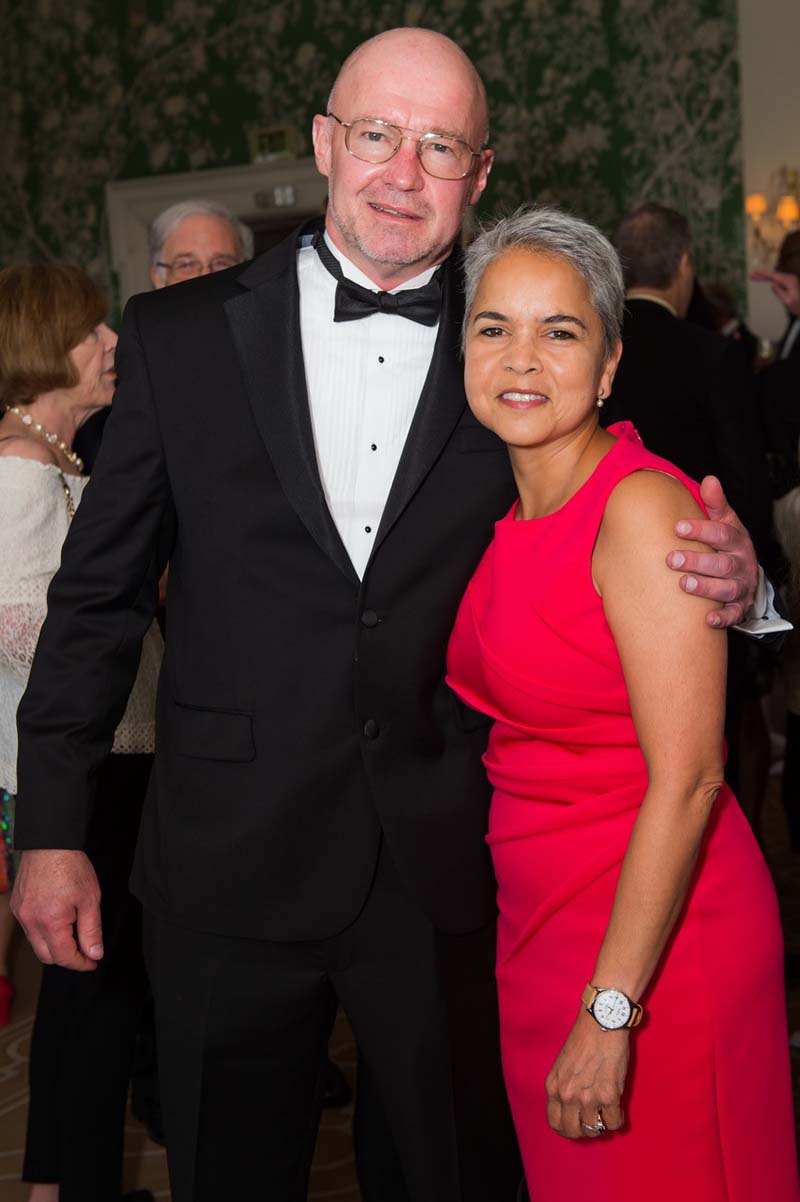
“It didn’t feel stressful at all,” she said. “It just felt like one giant, celebratory year.”
Miranda and her husband, Chris Geron, love to fish, a passion that often determines where they vacation. When they went to Sweden to fish, they decided to get married in Stockholm to avoid planning a big wedding.
Three years later, they started their family, which now includes a son and two daughters. The elopement has worked for 30 years, she said, and they still fish together.
At Duke, Miranda began her research and teaching in environmental policy and found herself drawn to interdisciplinary approaches. Over 21 years, she rose from assistant professor to full professor in the Nicholas School of the Environment, with joint appointments in the Integrated Toxicology and Environmental Health Program, Department of Pediatrics and Duke Global Health Institute. She also won the university’s top teaching award.
Miranda became an expert in using geospatial mapping techniques to study challenges in solid waste and land management, which transformed into her specialty in children’s environmental health as her own family grew. Her most-cited article titles migrated from “Market‐based incentives and residential municipal solid waste” to “The relationship between early childhood blood lead levels and performance on end-of-grade tests.”
An interest in the joint effects of social and environmental exposures led her to study the impact of racial residential segregation on health. She is the founding director of the Children’s Environmental Health Initiative, a research, education and outreach program committed to fostering environments where all people can prosper. Over the course of her career, Miranda has received more than $60 million in funding from federal, state and foundation sources.
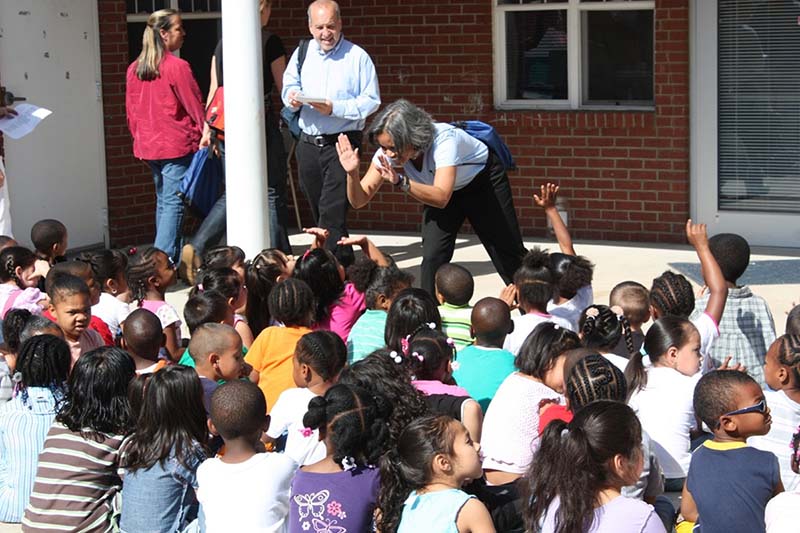
She sees South Bend’s history of lead paint problems in old homes as an important place for her research to continue. She has already spoken to local health officials about how her research group could be helpful.
“I’ve maintained my research program as a dean and as a provost,” she said. “I hope to continue research because it helps me understand the daily lives of faculty better, and also it’s an opportunity to use a different part of the brain.”
Administrative moves
At the start of 2012, Miranda took the opportunity to return to her home state and become the dean of the University of Michigan’s School of Natural Resources and Environment (SNRE). In four years there, she advanced fundraising, oversaw a reform of the curriculum and built relationships between SNRE and other UM schools.
After living in the Midwest, South and Northeast, she said moving to different parts of the country offers opportunities to learn beyond the classroom.
“In each of those places, whether it’s the culture or the weather or music or food, you find things to love about wherever you’re living,” she said.
Rather than second guess, she tells her kids and students to focus on making the best of each situation, because “you have a role to play in determining” the outcome of the decision.
“There’s an attitude with each choice you make, whether it’s a job move or a family decision,” she said. “People spend a lot of time thinking about, Should I do A or B? But really, most of our time should be spent not on making the ‘right choice,’ but saying, OK, I picked B, now how do I make the choice right.”
“There’s plenty of literature to indicate that functional diverse organizations are more productive and more effective than ones that are less diverse.”
Rice named Miranda the Howard R. Hughes Provost in 2015, where she led the Texas university’s academic, research, scholarly and creative programs with a $700 million annual operating budget. Major initiatives included strategic investments in molecular nanotechnology, data sciences, neuro engineering, synthetic and physical biology, and inequities and inequalities.
She oversaw the Baker Institute for Public Policy and the Kinder Institute for Urban Research and also appointed or renewed nine of Rice’s 10 deans. The success of first-generation students and those from lower socioeconomic backgrounds was a priority, as was increasing the gender and racial diversity of the faculty and academic leaders, practices she will continue at Notre Dame.
“There’s plenty of literature to indicate that functional diverse organizations are more productive and more effective than ones that are less diverse,” Miranda said. “I think there’s an opportunity case to be made as well. I believe we get richer and more productive dialogue and scholarship. And for diverse students to have a good experience at the university, it’s very clear that seeing people that look like them and have backgrounds like them is part and parcel of feeling like this is a place that’s meant for them.”
Miranda said she learned from these efforts and from managing Rice’s response to Hurricane Harvey that effective communication is crucial in leadership. As one of the few women or people of color both in her field and in elite university management, she has thought often about the subject.
“You have particular and unique perspectives that you’re able to offer because of your background,” she said. “But you have to find ways to bring others into conversations such that people can really hear each other.
“There’s what you say and there’s what people hear. The art of good communication is bringing those two things as close together as possible.”
Leading Notre Dame
Miranda announced that she would step down as Rice’s provost and take a sabbatical year at the end of the 2018-19 academic year after her youngest daughter had been diagnosed with cancer. When her daughter lost her hair during treatment, Miranda shaved her head in solidarity.
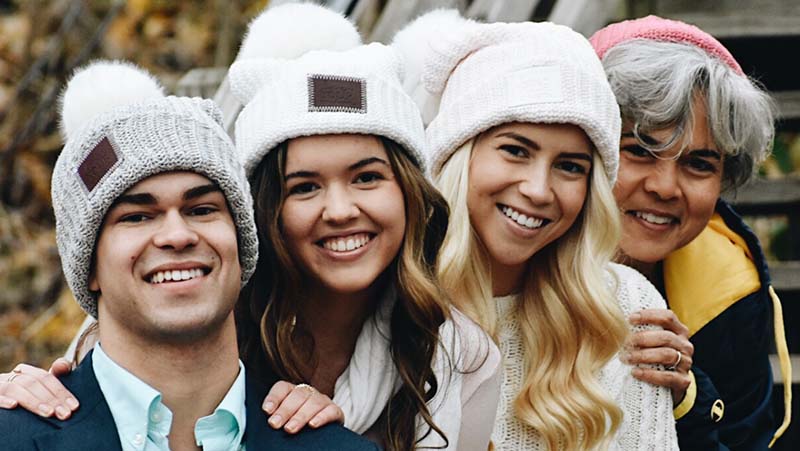
“I couldn’t be the parent I wanted to be to her and the provost the university deserved at the same time,” she said. “Given that choice, it was clear that I needed to focus on the family.”
The provost role at Notre Dame immediately appealed to her, Miranda said, when she learned of the search to replace Burish. Compared to other universities, she said Notre Dame has a unique opportunity to do what all institutions want — to develop the whole person, including the mind, body and spirit.
“Other universities, if they try to address that spiritual health, they tend to come at it sideways because their mission is about research and teaching,” she said. “But when you come at it sideways, you often veer off before you really make an impact.
“At Notre Dame, we’re very clear that we’re about holistic formation. We have an ability because of our mission to go at it directly, to speak straightforwardly and candidly that we take that approach.”
One example, she said, is financial aid. Despite expecting a greater need due to the economic fallout of the pandemic, Notre Dame is committed to maintaining or expanding aid because that is a key value of the institution.
“At Notre Dame, we’re very clear that we’re about holistic formation. We have an ability because of our mission to go at it directly, to speak straightforwardly and candidly that we take that approach.”
A provost normally shapes the faculty and “figures out how to advance student and faculty ideas,” she said. But this year is different, with a new range of short-term goals.
“We have to develop a whole suite of health and safety protocols that make it possible for us to bring our faculty, staff and students back to campus in a way that protects their health,” she said. “Secondly, we have to figure out how to continue to effectively deliver our educational programs and our research aspirations. The third thing is to figure out how we maintain that Notre Dame culture that is so caring and loving within the context of physical distancing.”
Recent national events, including both the pandemic and protests over racial injustice, call out for University engagement, she said. Yet health concerns could limit the response and require creative new methods.
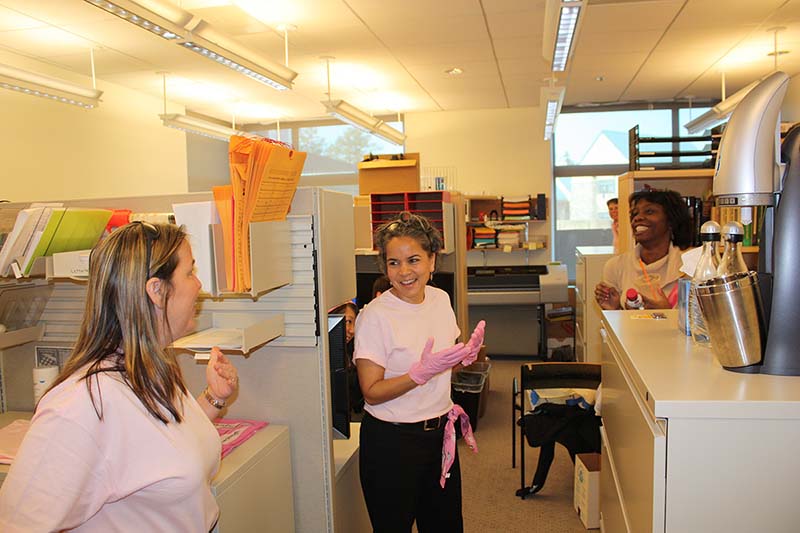
“How do we commit ourselves to being a direct and meaningful part of changing the world that creates these intolerable circumstances?” Miranda said. “All those fault lines that COVID-19 has so clearly revealed — that have been there for a very long time — I would argue that we should make it impossible to ignore those fault lines going forward. So we want to take on those challenges, but we have to do so without using our go-to method: physically coming together.”
Likewise, the formation of long-term goals is usually done through lots of meetings and discussions that bring out different ideas. Miranda said Notre Dame’s clear sense of values will steer it through decision-making in challenging times.
“The University comprises passionate faculty, students, and staff,” she said, “and we need to bring all of them into the conversation about what we want Notre Dame to be five years from now, 10 years from now and 50 years from now.”
